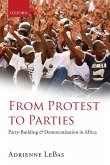At the close of the twentieth century, political protests have erupted throughout the world. While the collapse of communism was certainly one of the most spectacular protest- related events, smaller protests have become ubiquitous. In Los Angeles, labor activists campaign against commercial real estate owners to unionize janitors, mainly Latina immigrants. In the People's Republic of China, peasants revolt against tax collectors. Amazonian Indians protest public and economic policies that destroy their culture and rainforest habitat. This book analyzes the reciprocal impact of cultural beliefs, sociopolitical structures, and individual behaviors on protests throughout the world. Why do individuals participate in protest activities? How do cultural beliefs, personal attitudes, and subjective perception influence the potential protester? Addressing the issue of agency in protest, the authors also examine why protestors enlist different tactics to achieve their goals. Why are some protests violent and others nonviolent? When and why do activists conclude that it is better to accommodate than confront? Finally, and crucially, what are the consequences of protest movements?
Hinweis: Dieser Artikel kann nur an eine deutsche Lieferadresse ausgeliefert werden.
Hinweis: Dieser Artikel kann nur an eine deutsche Lieferadresse ausgeliefert werden.








